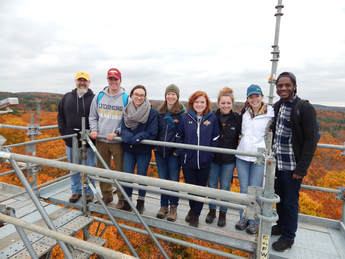I have a love of teaching and am dedicated to creating an experience for my students that is educational and enjoyable. My teaching is unified by the same breadth of ecological knowledge and interdisciplinary approaches as my research. I stress that contemporary approaches to sustainability, management, and restoration require a holistic approach that addresses issues of environmental justice driven by social inequities. My classroom instruction is designed to develop comprehension and critical thinking through active learning and other student-centered approaches. I help students develop a holistic understanding of the entire subject area without relying heavily on memorization. I using computer-based technologies for teaching and constantly work to develop approaches for integrating quantitative concepts in my courses. Teaching ecology and environmental science helps me find ways to get students outside and learning in an active environment. The images below highlight some of the enjoyable and impactful ways students learn in my classes.
|
The following is a list of courses I've taught as the instructor of record:
|
GIS posters
Below are examples of the poster projects created in my Introduction to GIS course. It is taught as a science elective (with a lab), but it serves as a major/minor requirement across several programs at Lycoming College. I center the course around interdisciplinary environmental and geospatial sciences that are applicable to just about any field. Posters are presented during a research session to the entire campus. Faculty, students, and administration are invited to see what students have accomplished. The hope is that some of this work can support future research on campus by the students involved.
Campus sustainability posters
Every year for my Environmental Biology course, students are required to propose a campus sustainability project and present the idea through a poster to campus. The projects can be simple or grand, but must be feasible. Faculty, students, and administration are invited. The great thing is that campus facilities and administration view the posters to potentially implement certain ideas (we have started to implement two projects thus far). As a non-majors introductory course, this is also an opportunity for many students to give their first presentation of this type.
Teaching resources
Below are teaching resources I've developed, which are free to download and use in your courses. Please feel free to contact me at [email protected] if you have any questions or concerns about this material.
Teaching logistic population growth and ecological modelling:
Reducing barriers to teaching with R in undergraduate biology
I participated in a Quantitative Undergraduate Biology Education and Synthesis (QUBES), Faculty Mentoring Network (FMN) program to produce a lesson for students to examine population growth using the R statistical environment (using Swirl). The lesson is designed to 1) teach students about the concept of logistic population growth, growth rates, and carrying capacity and 2) provide a basic introduction to ecological modeling and quantitative thinking in ecology. The citation and link to the lesson is:
Smith, R. F. (2019). Teaching logistic population growth and ecological modelling. Reducing Barriers to Teaching with R in Undergraduate Biology, QUBES Educational Resources. doi:10.25334/Q4CF1M
Smith, R. F. (2019). Teaching logistic population growth and ecological modelling. Reducing Barriers to Teaching with R in Undergraduate Biology, QUBES Educational Resources. doi:10.25334/Q4CF1M
RABLE 2019 files (Using MS excel in biology labs)
Files below are those presented for a major workshop at the Regional ABLE (RABLE) Conference, Saturday, October 5, 2019 at Allegany College of Maryland, Cumberland, MD. The title of the workshop was: MS Excel for teaching quantitative concepts in biology: An introduction and case study examining climate data
| rable_2019_materials_v06.1.zip | |
| File Size: | 9031 kb |
| File Type: | zip |
Using MS Excel (for ABLE 2018)
Files for this lab are currently not listed here (because I'm using them for remote instruction). Please contact me at [email protected] if you'd like a copy of the complete set of files.
Files now part of the RABLE 2019 section above.
| ABLE_2018_poster.pdf | |
| File Size: | 694 kb |
| File Type: | |

